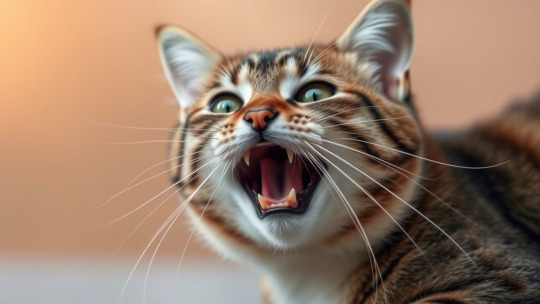catrofix - Decoding your cat's behavior: A comprehensive guide to common cat behaviors
Don't wanna be here? Send us removal request.
Text
I’ve always been passionate about understanding my feline friends, and one mystery that truly captivated me was their tendency to meow relentlessly at night.

Over the years, I’ve discovered that the reasons behind these nocturnal serenades are as varied as the cats themselves. In this article, I share my personal journey and insights on why my cats meow at night—and the steps I’ve taken to bring peace back into my nights.
My First Encounter with Nighttime Meowing
When I first brought home my new feline companion, I was both excited and unprepared for the nighttime chorus. I soon learned that a New cat meowing at night was often more about adjusting to a new environment than mischief. I remember sitting up late, trying to soothe my little friend who was clearly anxious in this unfamiliar setting. With time and patience, I discovered that providing a cozy, safe space and a consistent routine could make a huge difference.
Discovering the Many Faces of Feline Nocturnality
The Unique Needs of Female Cats
I noticed that my female cat sometimes exhibited a different pattern of meowing at night. It wasn’t just about hunger or boredom—it often had to do with her unique hormonal cycles and social instincts. Researching further, I found valuable insights on Female cat meowing at night which resonated with my observations. Understanding these differences helped me tailor her nighttime routine and provide extra comfort during those restless hours.
Embracing the Wisdom of Age
As my feline companion aged, I began to appreciate the nuances of an Old cat meowing at night. Unlike the energetic antics of a kitten, an older cat’s vocalizations often signaled discomfort or a need for reassurance. I learned to pay close attention to any changes in her behavior, ensuring that she received the medical attention and gentle care she deserved during her golden years.
The Special Case of Foster Cats
When I temporarily fostered a cat, I encountered yet another layer of complexity. A Foster cat meowing at night can be particularly challenging because the animal is often dealing with the stress of transition and past trauma. My approach was to create a quiet, predictable environment to help ease the foster cat’s anxiety, and I found that even small gestures of care went a long way in reducing nighttime vocalizations.
Tackling the Challenge: How I Learned How to Stop Cat Meowing at Night
After many sleepless nights, I realized that simply trying to quiet my cat wasn’t enough—I needed to understand the root cause of the behavior. Through trial and error, I implemented several strategies:
Routine and Environment: Establishing a regular bedtime routine and creating a calming environment helped signal to my cats that nighttime was for rest. Soft music, dim lighting, and a comfortable sleeping area made a significant difference.
Interactive Play: Engaging my cats in vigorous play sessions before bedtime helped expend their energy. A tired cat is far less likely to disrupt the night with incessant meowing.
Feeding Schedule: Adjusting feeding times so that my cats received a satisfying meal before nightfall also reduced their hunger-driven meows.
Medical Check-Ups: Regular visits to the veterinarian ensured that any underlying health issues were caught early, particularly when I noticed unusual patterns in their behavior.
When Health Concerns Strike
There came a time when I noticed a sudden change: my cat’s meowing became more persistent and intense. Worried about potential health issues, I researched the possibility of underlying conditions such as kidney problems. I discovered that Cat meowing at night kidney disease could be a sign of discomfort or pain. This prompted me to schedule a thorough check-up, and fortunately, we were able to address the issue promptly.
Answering the Big Questions
As I continued my journey, I found myself constantly asking: Why is my cat meowing so much all of a sudden at night? Often, a sudden increase in vocalization can signal stress, changes in the environment, or even pain. By carefully observing my cat’s behavior and consulting with my vet, I was able to pinpoint the cause and implement the right changes.
Similarly, I once wondered, Why does my male cat cry at night? In my experience, the answer often lies in a combination of territorial behavior and the need for companionship. Understanding this helped me modify his environment to ensure he felt secure and loved, even during the quietest hours.
And then there were those nights when I’d ask myself, Why does my cat yowl at night when I go to bed? I realized that this behavior was sometimes a plea for attention—a reminder that even the most independent creatures sometimes just need a little extra care and companionship.
Final Reflections
Through trial, error, and endless nights of observation, I’ve come to appreciate that each meow tells a story. Whether it’s a new cat struggling to adjust, a senior cat seeking reassurance, or a foster cat healing from past traumas, understanding the language of their night-time calls has made me a better pet owner and a more empathetic human.
By addressing both the emotional and physical needs of my cats, I’ve not only managed to reclaim my nights but also deepened the bond I share with them. For anyone facing similar challenges, remember that patience, consistency, and a willingness to learn can transform even the most disruptive behaviors into opportunities for connection and growth.
I hope that by sharing my journey, I’ve provided valuable insights into the world of feline nighttime behavior. Every cat is unique, and what works for one might not work for another. Trust your instincts, seek professional advice when needed, and cherish the moments—both loud and quiet—that make your relationship with your pet truly special.
2 notes
·
View notes